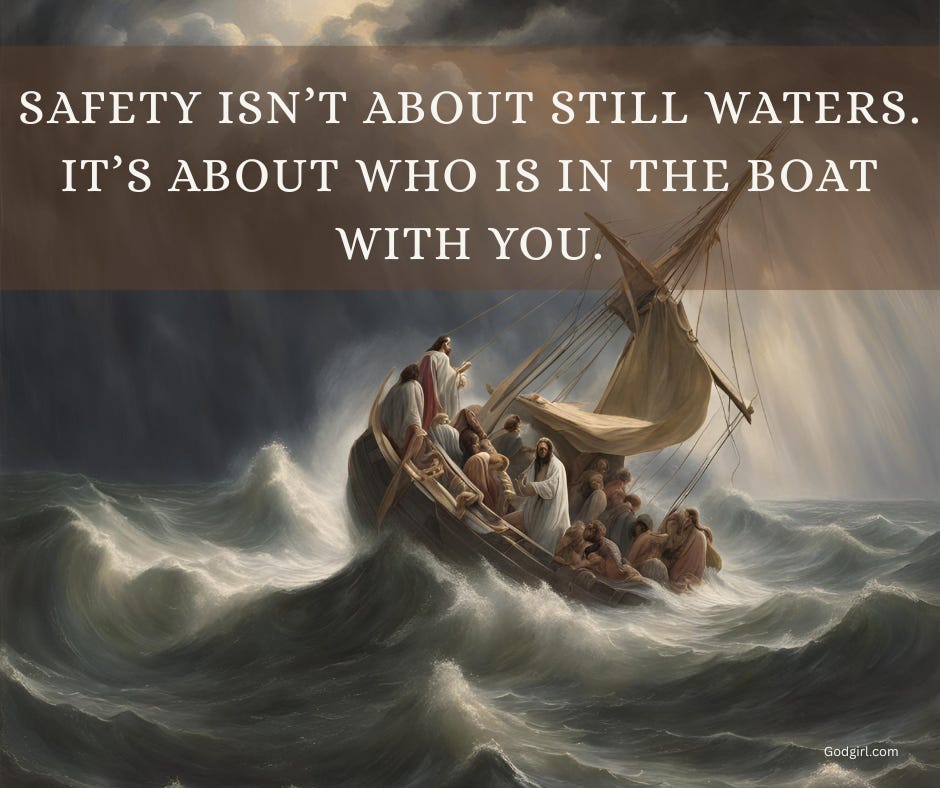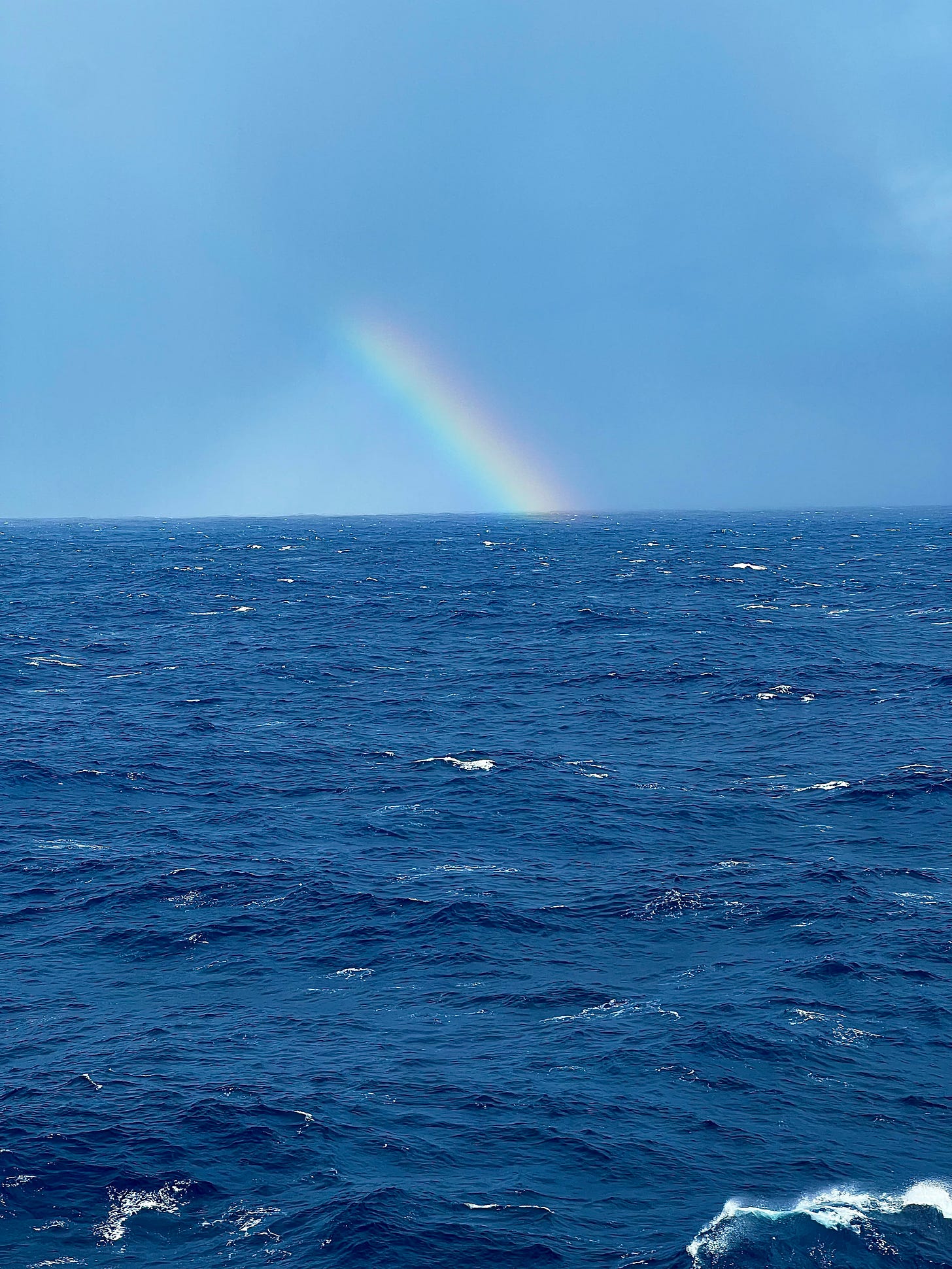Safety Isn't About Still Waters
it's about who is in the boat with you
Cruising through 20-foot swells isn’t something I ever want to repeat. The ship rolled and pitched like a seesaw for two days straight. Plates slid off tables in the dining room. People lined the hallways, clutching their stomachs, throwing up into little bags strapped to all the stair rails.
I lay out flat in our cabin, eyes squeezed shut, gripping the sheets to keep from rolling off. And every time the ship rose and dropped, my stomach heaved. Nausea pulsed through my veins like poison. I was sure I would die of seasickness. It felt like drowning from the inside out.
Michael sat on the couch, watching movies and eating pizza with the calm of a man in his living room recliner. The ship rolled, and he shifted his weight, unbothered. The difference isn’t in our stomachs. It’s in our minds. Not that seasickness is all in your mind, but fear prepared me to be sick long before the waves did. Each swell felt like doom because my mind was totally prepared for doom. My husband’s mind called it the cradle of the sea.
If you know me, you’ve probably heard me say fear is just negative faith. That’s because it believes that the worst thing is a more plausible outcome than the best. It rehearses disaster until the body trembles at it.
When Jesus talked about worry, He called it out by asking, “Can any of you by worrying add a single hour to your life?” Ok, I’m sure the answer is no, but at least my fear is gonna try by anticipating every danger and keeping me as far away from it as possible. But fear doesn’t just warn me; it locks me up. It puts me in a padded room where nothing can touch me, not even life itself.
Faith, on the other hand, doesn’t deny the danger; it trusts the One who not only walks me through it, but rules over it.
Fear rehearses death; faith rehearses resurrection.
“I am the resurrection and the life.
The one who believes in Me will live,
even though they die.”
— John 11:25
One keeps me strapped to the sickbed, waiting for doom.
The other lets me stand, even in the storm, knowing the storm is not the boss of me.
The disciples found themselves afraid in a boat, too. And when Jesus calmed their storm, Scripture says they were even more afraid. Why? Because suddenly they realized the One in the boat with them was more powerful than the storm outside.
But why fear Him? Why were they so afraid of Jesus, the One they knew, their friend? Maybe because, like us, they were, oddly enough, more comfortable with predictable chaos than with holy unpredictability. Danger we can understand. But a God in our midst who commands danger? That shakes us in a more tactile way. Because suddenly it’s not about survival anymore; it’s about surrender.
For the disciples, it was surrendering to Jesus as Lord as He calmed their storm. For us, it’s surrendering even when He doesn’t calm the storm on our plea. Today, He isn’t asleep in the stern waiting for us to shake Him out of His sleep. He’s already awake, already Lord over the downpour and the dread. Even when the storm keeps raging. And the waves don’t die down. The impending doom doesn’t lift. But the call is still the same: surrender to the One who rules both the danger and the deliverance.
That’s the shift I long for. To move from fearing the waves to surrendering to the One who rules them. Seasickness may still knock at my stomach, but I’m learning that you often get what you expect. If I meet the waves braced for doom, every swell feels like death, but if I meet them as the cradle in which the Lord has placed me, they suddenly lose their power to drown me.
My goal on this floating city, on which I have found myself for six weeks, is to remember that peace isn’t the absence of motion but the surrender to the power and presence of Christ in the midst of the storm, unshaken, turning even the raging sea into the cradle of His stillness
That’s why I remind myself, “Even though I walk through the valley of the shadow of death, I will fear no evil, for you are with me.” (Psalm 23:4)
Today, whether your waves are ocean swells or inner turmoil, refuse to let fear tell you what is most real. Your nausea, your trembling, your dread are not your God. And the One who spoke peace to the sea still speaks it over you.
NOTE: As I wrote this from the balcony above the raging sea, its toiling, moiling, storming finally spent, I looked up to see the beginning of a rainbow. Proof of His presence, punctuated with an exclamation point!
Field Testing The Calm Sea Illusion
“On that day, when evening came, Jesus said to his disciples, “Let’s go across to the other side of the lake.”So after leaving the crowd, they took him along, just as he was, in the boat, and other boats were with him. Now a great windstorm developed and the waves were breaking into the boat, so that the boat was nearly swamped. But he was in the stern, sleeping on a cushion. They woke him up and said to him, “Teacher, don’t you care that we are about to die?” So he got up and rebuked the wind, and said to the sea, “Be quiet! Calm down!” Then the wind stopped, and it was dead calm. And he said to them, “Why are you cowardly? Do you still not have faith?” They were overwhelmed by fear and said to one another, “Who then is this? Even the wind and sea obey him!”” (Mark 4:35–41)
Why we’re testing this passage:
Peace often feels like calm waters, but Jesus seems to locate peace somewhere deeper, in the presence of faith, not the absence of storms.
1. Let’s start with their assumption.
What did the disciples assume about Jesus’ sleep?
How might that assumption shape their question: “Don’t you care that we are about to die?”
What does fear tend to assume about God’s attention?
2. Examine the word “cowardly.”
The word deilos means timid, fearful, lacking courage.
What does cowardice look like in spiritual terms, not in battle, but in belief?
Can cowardice ever come from God?
What does come from faith in God when fear rises? (Consider 2 Timothy 1:7.)
3. Define courage in context.
If courage isn’t bravado or confidence in outcomes, what is it here?
What gives someone courage when the sea doesn’t still?
4. Test the transfer.
Jesus calmed the storm outside, then addressed the storm inside.
What does that suggest about the kind of peace He’s most interested in, surface calm or soul calm?
The test isn’t whether the waves obey you, but whether your heart still knows who they obey.





This is just full of meat to gnaw on. I like to eat the beef out of the stew before the veggies. This is a great Bible study. Thank you Hayley
Absolutely love this. Awrrr, the rainbow! So precious that God sees us when we get all tangled up in fear and how he'll send a comforting reminder of his loving, caring presence.